The Dave Ramsey Baby Steps – Do They Actually Work?
Some products in this article are from our partners. Read our Advertiser Discloser.
Dave Ramsey is a world-renowned personal finance expert who created seven baby steps to help people have a roadmap to get their finances in order.
These same steps actually helped me pay off $52,000 of consumer debt in just 18 months.
In this article, I am going to go over Dave Ramsey’s baby steps in detail. I’ll explain how they work, what you should look out for and how they will help you achieve financial freedom.
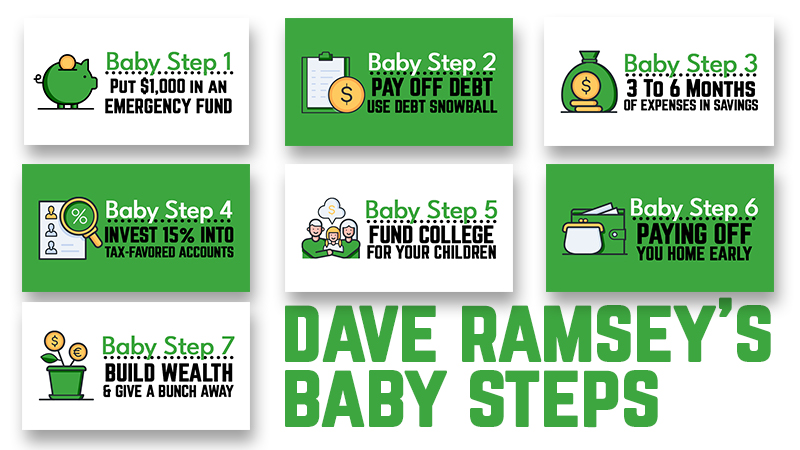
Who is Dave Ramsey?
Dave Ramsey is a personal finance expert best known for his popular radio show, The Ramsey Show.
It is currently syndicated nationally in the United States on over 600 radio stations and has over 16 million listeners per week.
He is also behind Financial Peace University and the popular budgeting app, EveryDollar which helps people stay on track when they follow his baby steps.
Lastly, Dave Ramsey is a New York Times best-selling author of multiple books
What Are the Dave Ramsey Baby Steps?
| Baby Step | Action |
| 1 | $1,000 in an Emergency Fund |
| 2 | Pay off debt using the Debt Snowball Method |
| 3 | Put 3 to 6 months of expenses in savings |
| 4 | Invest 15% of household income into retirement accounts |
| 5 | Fund College for children |
| 6 | Pay off your home early |
| 7 | Build wealth and give a bunch away |
My Video Review of Dave Ramsey’s Baby Steps
The Breakdown of Dave Ramsey’s 7 Baby Steps
Ready to learn more details about each of Dave Ramsey’s Baby Steps? Let’s go!
I want to help you figure out where you are in the process. This is important. Let’s start with a breakdown of what each of the Baby Steps entails. See where you’re at and jump in on the step from there.
1. Save $1,000

Dave calls this step the “starter emergency fund.” It might seem silly to start by saving $1,000.
After all, you could be putting that money toward reducing debt. But Dave has some good logic behind the emergency fund baby step:
“Unexpected expenses happen to everyone. And for some reason, they tend to happen more when you’ve just committed to getting out of debt.
To avoid being tempted to use your credit cards to handle these unexpected costs, save a quick $1,000 and put it aside as a buffer from those emergencies.”
So what happens if you’re paying off debt and have an emergency? Use some of the money in your starter emergency fund.
Stop paying extra on your debt for now. Use the fund to pay cash for your emergency. Then, put any extra money into a high-yield savings account until it reaches $1,000 again.
After it’s at $1,000 again, you can resume the debt snowball. Handling emergencies this way will help ensure your credit card balances continue declining. They won’t go up due to emergencies.
2. Pay Off Debt
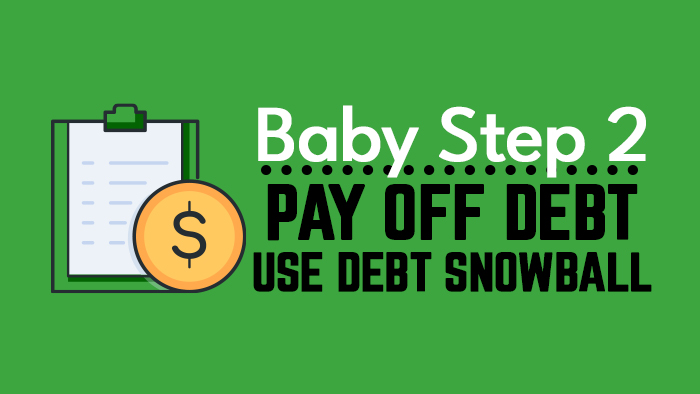
Paying off debt is the second part of Dave Ramsey’s Baby Steps. The debt avalanche (paying off debts according to the highest interest rate) will save money in the long run.
Examples of debt include:
- Credit card debt
- Student loan debt
- Personal loans
- Medical debt
- Loans from family or friends
However, the debt snowball method is often better for debt payoff. Why? Because it keeps people motivated.
Whether you are getting out of credit card debt or paying off student loans, getting debt-free is a long journey for many. The debt snowball gives you quick wins from the start. The quick wins can motivate you to stay the course.
What is the debt snowball method?
Here is how it works:
- List your debts from smallest to largest
- Make the minimum payment on all debts except the smallest one
- Put any extra funds toward the smallest debt until it’s paid in full
- Tackle the next smallest debt on your list with all your extra cash
- Repeat this until all debts are paid off
Check out our free debt snowball calculator here.
Bonus: Being able to mark those smaller debts as “Paid in Full” faster will motivate you. It’ll give you faith that you can win the battle against debt.
Download the Debt Snowball form here.
3. Save 3 To 6 Months of Expenses For Emergencies
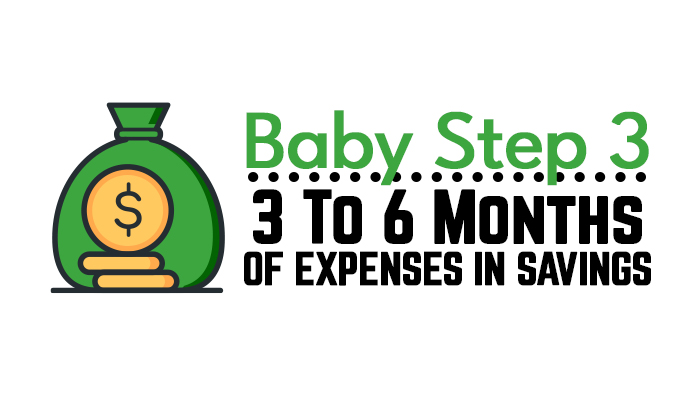
Ramsey’s next suggested baby step is to increase your emergency fund. You’ll save until it contains 3 to 6 months of household expenses. It might seem daunting to save that much money.
However, Ramsey has a method for doing it quickly. If you’ve finished Baby Step 2, you are free of consumer debt. The only debt you have left should be mortgage debt.
Next, you’ll take the money you used to pay down debt. Don’t coast on your new, smaller payments.
Instead, take the money and make a “payment” to yourself. Use the money that you were putting toward your debt snowball.
Make regular savings account deposits with it. Doing so should help you finish your emergency fund faster.
An emergency fund will protect you and your family and provide a buffer against major financial emergencies. Troubles such as job layoffs and major home repairs won’t require credit cards; instead, you’ll pay for them with cash.
4. Maximize Retirement Investing
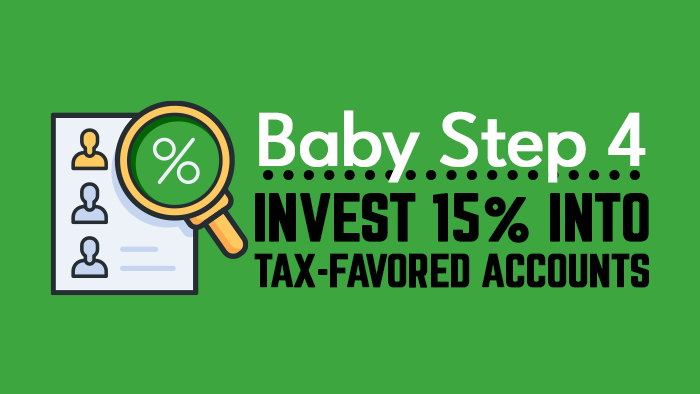
Look at you now! Your consumer debt is gone. You have an emergency fund that’s fully funded. It contains 3 to 6 months’ worth of expenses.
The next step is putting 15% of your income into tax-favored retirement accounts.
For 2023, this means contributing up to the legal maximum allowed by the IRS. That maximum is $22,500 a year for 401(k)’s and $6,500 for IRAs.
Ramsey suggests saving 15% of your income.
For instance, if your household income is $100,000, then you would invest $15,000 per year.
Note that those 50 and over can add more cash to retirement accounts.
- $7,500 to their 401(k)
- $1,000 to their IRA
These are called “catch-up” contributions. If you can make them, do it. Maxing out your retirement investing helps ensure your golden years will be secure. The more you save, the more comfortable you’ll be.
5. Fund Kids’ College
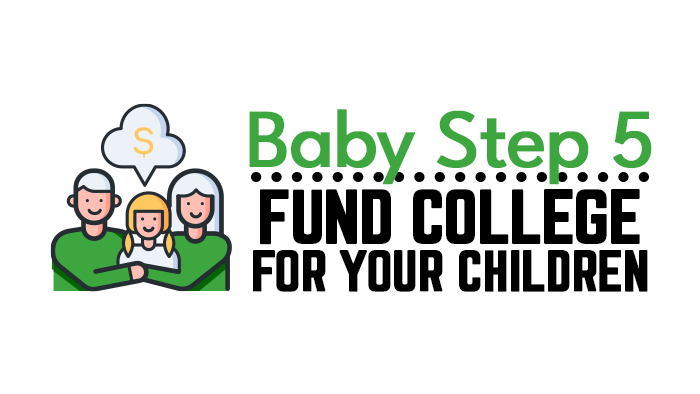
There’s one thing I like about the college section of Dave Ramsey’s Baby Steps. Ramsey is clear that college doesn’t guarantee career success for your kids.
He goes into great detail about the importance of calculating the cost vs. the benefit of college. Do this before you send your kid out to spend $25,000 a year on schooling.
It’s important during this step to talk with your spouse. Decide how much money you can afford to set aside for your kids’ education.
The dollar amount you contribute to your children’s college fund is up to you. Be sure you research the different college-saving options as well. Make sure that what you plan to contribute to your kid’s college education is affordable for your family.
It’s also wise to have a specific education savings account for this purpose.
In addition, make your plan clear to your kids. They should know what to expect from you regarding college financing help.
As a final tip, consider college alternatives to contributing to your children’s college fund. You may end up saving big money in the process.
6. Pay Off Home Mortgage
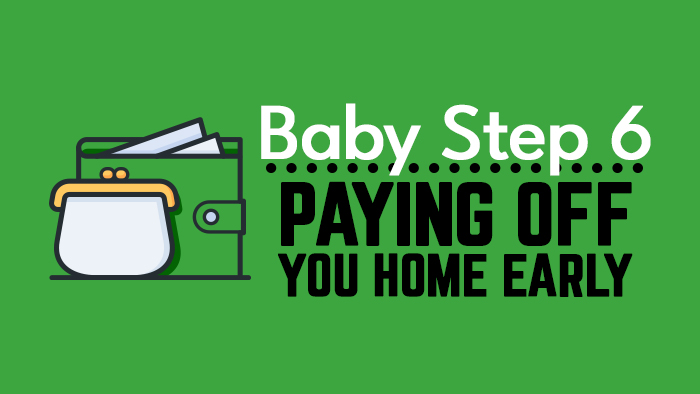
So you’ve paid off all of your consumer debt. You’ve got a fully funded emergency fund. You’re contributing at least 15 percent of your household income toward your retirement accounts.
In addition, you have a plan for contributing to your kids’ college educations. What’s next? It’s time to pay off the mortgage faster.
Can you imagine being mortgage-free? Not owing anybody anything? They say the grass feels different under your feet when you own your home. Now, it’s time to find out.
You’ve created a solid budget so that you know where your money goes. Now, take all of your extra funds. This includes funds that were going toward your debt snowball. And the amount you were putting into your emergency fund.
Put it all toward that mortgage loan. Get it paid off in full as soon as possible. Put any extra money toward the mortgage loan as well, so you aren’t just making the minimum payments.
The extra money could include:
- Gifts
- Tax refunds
- Work bonuses
- Overtime pay
And any other money you don’t usually get. Since it’s unexpected money, you won’t miss it. Don’t spend it on other stuff. Instead, use it to pay off that mortgage.
The less interest you pay to the bank, the more money you have. You can give it to worthy causes and use it to fulfill your dreams.
It’s your job to discover those dreams, which leads to Baby Step #7.
7. Build Wealth and Give
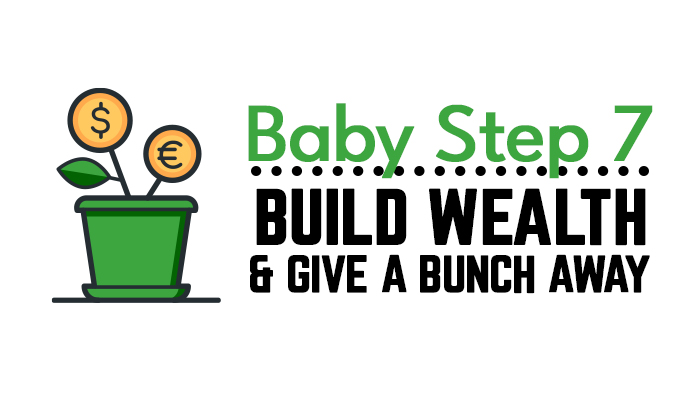
Here’s the best step! At least, in my humble opinion. You don’t owe money to anyone. And you’ve got a nice stockpile of savings.
What does that mean? It’s time to build wealth.
That wealth-building can come in a variety of forms. You can invest in mutual funds. Or, you can invest in real estate. If you want, you can sock the money away in a high-interest account.
The goal is to put as much money as possible toward whatever your financial goals are. That might mean traveling the world. Or it might mean building your dream home. Maybe you want to live life as a philanthropist.
You’re completely debt free. Now you’re working at having amassed a serious amount of wealth. The world is your oyster, and your dreams are unlimited. How does that sound? Good?
Do the Dave Ramsey Baby Steps Work?
From my first-hand experience, I can say YES, the baby steps do actually work. Not only did it help us become debt-free, but I have been able to see other friends and family become debt-free as well.
It does take work on your part to get the results, but if you work the steps, the results will follow.
Dont just take my word for it, see what people on Reddit are saying about the Baby Steps as well.
Summary
If you want to achieve financial freedom, start working the baby steps in your life today. We used these steps personally to pay off our debt and start building wealth. If we can do it, you can too.
Start taking the necessary steps to improve your finances today with the Dave Ramsey Baby Steps.

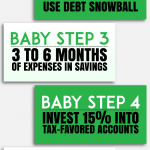

Christy, what is the rate on the card? If you saved 20K in a year by cutting expenses that would be $1,600 a month. If you can consistently save that much why not consider a balance transfer to a 0% credit card? You have to be disciplined but that would cost you about 3% or $600. On the other hand if you feel your financial situation is stable then do the reverse and pay the credit card and refill your savings (plus save the $600)
Thanks Deacon for your response. I am not saying I have a better way or something is working better for me. I am just asking a couple of simple questions that involve how debt repayment works. My example of the car was to illustrate that term debt is amortized with interest higher at the beginning of the loan period and much lower at the end. My point was that paying off term debt before credit card debt may or may not make sense. Back to the car example, my wife has a minivan. The last payment we made was $296. Of that $2.50 was interest. The principle balance was $2,100. At the same time we have a credit card that has an $8,000 balance and the last month interest charge was $130. Mathematically, it seems logical to continue to pay the car loan and divert any additional cash to pay down the credit card debt.
On the other hand, I think your plan is simply to help people get out of debt and the snowball requires no analysis and tries to make things simple. I can get behind that. Index fund investing is the classic example of this. No need to spend hours trying to analyze risk adjusted performance on individual securities. I get that making things complicated can lead some people to not succeed.
In the end though, is my debt example that hard to understand for most people?
Yes! Your example makes sense. Sounds like you have a good plan to pay off debt! Best of luck!
I don’t understand the need to pay off certain debt. While I like what you are doing it seems so simplified. For example, my wife’s car has 6 months remaining. The amortization table would show that nearly all of that goes to principle and very little to interest. It would seem a wiser choice would be to evaluate your debt first, but this is not part of the plan. Car loans like I describes would be better paid on their regular monthly payments and divert the money to unsecured debt. Second, on mortgage prepayment. If you had a 4.5% loan in a 2% inflation environment, you have an effective rate of 2.5%. Shouldn’t you evaluate the low risk investment returns first? If you can get a low risk return of 3.5% or 4.5% then you are better off saving your money and paying the lender.
It depends on the situation! David Ramsey’s method is just one of many. If you have something that is working better for you, such as your mortgage and your car, then do it that way! Best of luck!
We read Dave’s book and have been under the plan for years. We have no credit card debt, 6 months salary in savings, 15% annual contribution to retirement funds (401k), and are currently paying an extra $300/mth towards our 30/yr mortgage. We currently owe $250,000 on said mortgage. We also just purchased 2 Airbnb (short term rentals on 30/yr. notes). The Airbnb’s are cash flowing (paying for themself + 10% over). In addition, we have a Will, 2 life insurance policies (one for each of us), and are contributing to 2 college funds $100/mth (12 & 10 year old girls). Husband is sole provider @ $250,000 year ($130,000 base + $120,000 commissions). Where should we focus our debt resolution? Do we focus on the smaller rental loans or our primary residence or more college saving or other?? Need your help!! Thanks!!
That’s awesome to hear! Sounds like you guys have a good plan! It definitely depends on what is most important to you, plus the interest you’re paying on each. If one has a high insurance that is costing you a lot extra than the rest of those things, it may be best to start there. Best of luck!
I have been doing the baby steps since January. Luckily I started with the Baby Step 1 completed. Though 1,000 seemed way too little for emergencies. I have about $1500 in an account for that. In addition I saved $20,000 this year just by shaving expenses, cutting grocery bill, taking lunch to work, carpooling to work with husband, phone bill, and strict budgeting using the every dollar app. (I love that app!) I just felt like my peace of mind having that 20K was important as we are in our 40’s/50’s, so I have essentially completed step 1 AND 3. We began the snowball method at the beginning of the year as well since I already had step 1 complete. And was working on the step 3 simultaneously. I was able to pay off a few smaller credit cards with no problem. My question is this: Should I take from the 20k savings to pay off a credit card, then reestablish that savings? Or just keep it as is and don’t worry about the extra interest I could save by paying it and rebuilding the buffer.
That’s mostly going to depend on your personal situation and how much debt you have. You definitely want to get that debt paid off because it’s racking up interest. But you want to make sure you have the savings you need for an emergency. It’s probably best to take care of that debt first and build back up the savings, but if the rest of that debt is taking out a substantial amount of savings and you don’t think you’ll be able to cover an emergency comfortably, you may want to break it down into smaller chunks. Best of luck!
Thank you for sharing. I’m motivated and well on my way to start the babystep process. I’m 64 years old and wish I would have bumped into this years ago.
Thanks again.
It’s never too late to get started! I wish you the best of luck!
You forgot to mention saving enough money to pay cash for your next vehicle before you start on maxing out your 401k contribution and paying extra towards your mortgage. That is a huge step that if you neglect, will leave you looking at going back into debt for an auto loan.
Of course it’s important to save for your next vehicle. So, yes, you are right that you need to budget that in.
We just finished baby step 3 and are currently looking for a house. My husband is a veteran with a disability, so we qualify for a VA loan with no down payment and no funding fees. We also both have over 10 year old cars that need replacing. We live in a high cost of living area (Boston), so the mortgage will be more like 40% of our take home (we make $170k annually, average homes are $550k). Is saving for a down payment necessary, or should we focus on using the cash for new cars and once those are paid for, funnel that money into paying the mortgage down?
Of course the decision is entirely up to you. It depends on several factors, though. For example, how much are you paying in rent right now vs what you mortgage payment would be both with and without that down payment? Also, remember that the less you put down as a down payment, the higher your payments will be and the longer you will have to make those payments to pay your house off. In addition, with no down payment, you could end up robbing yourself by paying several thousand dollars more in interest than you’d have to pay by building up a down payment first.
Just how bad of shape are your cars in? If possible, you might consider holding off on getting newer cars as long as possible and saving for that down payment first.
We have a couple of posts about buying a house you might want to read as well.
I am 66, retired, and a widow. I have $3600 a month coming in with my pension and social security. I also owe $129,000 on my home. I have no other debt and I do have some retirement accounts. Should I pay off my home, or is it worth having the mortgage for tax purposes?
Thanks,
Pat
It actually depends on a number of things. One is how you feel about having the debt hanging over you and having to make payments each month. Another is how large your payments are and how much interest you are paying. Still another is how much you spend each month for living expenses and one more is how large your retirement account are. All of these things can impact whether or not you should pay off your home now or keep making payments. It might help to figure how much interest you would be paying on the remaining balance of your home until it’s paid off. Then, look at how much money you could potentially earn if you invested the money instead, using conservative figures. Comparing these figures can help you make the best decision for your situation.
Don’t ever use retirement assets to pay off debts or mortgages because you could incur tax and penalty expenses that could wipe out your savings. Retirement accounts and investments should be used for retirement expenses only.
I have an astronomical amount of student debt. Is this in the pay off credit card debt section? If yes, I will never get out of debt! 🙂
Keep in mind that this method of budgeting and paying off debt can be used as a starting point or guideline. Everyone’s situation is different. That means you can tailor your budget and debt repayment method to match your own situation and needs. For some people, paying student debt falls more in line with paying mortgage debt, especially if the interest rates on your student loans is low. It’s totally up to you how you handle it.
Would a home equity line of credit fall under the debt snowball or home payment?
I would put it under home payment because home loans are usually for a larger amount. The debt snowball can still be used for a home equity line of credit if it is for a smaller amount, say a few thousand rather than tens or hundreds of thousands. The debt snowball is usually meant to pay off smaller bills and get the snowball rolling, so to speak, on paying off all of your debt.
I’ve been a single mom for a while. I have no more debt and I’ve saved my emergency fund. I have always maximized out my 401k retirement savings. I’ve got about $40k saved toward college for 2 kids that start in 3 and 4 years. I doubt there will be help for college from their dad. My kids will have at least a semester of college under their belts when they graduate from high school. I’ve been very aggressive at paying down the mortgage loan and only owe about $58,000 on my home (now valued at $450,000). The mortgage payment is about $750, but taxes, interest and insurance are still about $1250. I’ve also been contributing to a company stock purchase plan, and I actually have enough to pay off the house. YAY!! However, should I? Or, should I put it all towards retirement or my kid’s college?
I was thinking I should pay off the house and put the extra $700 a month into the college fund. Then I could do a HELOC, if needed, for part of their college costs. What do you think?
I know this doesn’t give you a definite answer, and nothing can be guaranteed in life, but if I were you I’d start running the numbers. The right decision depends on how much interest you’r paying on your home loan, how much interest you could gain in the college fund, etc. I know it will take some work, but when you start comparing those figures, you might get your answer.
Does the 15% include the employer match, or is that in addition to?
Well, it could be in addition to, but you just want to make sure you don’t go over the maximum allowed for each tax year.
I’ve been using retail therapy to ease my grief and depression. The result is a lot of credit card debt. I’m in a rob Peter to pay Paul situation. Paying extra in credit card payments but then leaving myself short for everyday expenses. It’s driving me insane! I pray and pray for an answer.
It sounds like you need to make some changes. We have some posts on this site about consolidating debt and how to get out of debt quickly. There may be some others on our site that will help too, of course. You might also need to try to find additional ways to make money so you have more income to pay your bills. We have lots of helpful ideas on this blog, so check them out. I hope you find some solutions that work for you.
Do you have any advice for starting behind the 8-ball here? I’d love to ‘save $1000’ – but I was sick for years, and only now just barely able to maybe work full time. I haven’t found a job yet that would allow me to save that much. I’m also a quarter of a million dollars in debt. Granted, some of that is student loans, and most is house, but still – it’s a staggering amount. Baby steps before the baby steps?
I would tell you to live on as lean of a budget as you can and throw as much toward your debt as possible. Work as much as you can and if you’re able, pick up a side hustle. While paying your debt won’t happen overnight, it is possible. Hang in there!
My husband and I purchased a small $100,000 life insurance policy 20 years ago (I am 56 years old and my husband is 63 with a lot of maintenance medications). Since I am 7 years younger than my husband, they set up my husband as a rider. We are currently paying $133.00 a month, but I just received a letter from the insurance co that we need to discuss an increase in our payment in order for our policy to be keep up with the current fees and charges.
Can you please advise if it is wise to keep the insurance or get a term insurance (I’m just afraid my husband can’t still get insurance due to health issues).
That really depends on several things. For instance, these days you can also use life insurance as an investment. So, before just taking out a policy blindly, I would seek the advice of a life insurance agent you trust. Also, you need to know what your financial situation is: how much you have already invested, when you want to retire, etc.
We have a post on our site that might help you decide what to do. It talks about the different types of life insurance policies that are out there. Check it out. I hope it helps.
Through four job losses, a heart attack, and viral meningitis that paralyzed my husband for months, it has taken us over 3 years to finally have baby step #1 completed as of Feb 15th 2018. I only have income 9 months out of the year. I have opened up a side business of custom embroidery and sewing/quilting. Luckily I already had my machines so, there was no additional expense in purchasing them. However, that is what I have been socking away on top of paying for meds for 2 type 1 diabetic boys and my husband’s many medications. It can be done, some just may take longer than others. For us, it has taken 3 years.
I disagree with paying your home off. That money should be invested elsewhere for maximum returns.
I have been working the baby steps with my husband for several years now and we hope to have our home paid off before our oldest starts college in 3 1/2 years. I just discovered your book and have it sitting with my Chris Hogan book, “Retire Inspired”. Your book is so inspirational. Thank you for the great information and encouragement, Deacon! Good luck to you on your journey as well!
Thanks, Sarah! I wish you the best of luck on your journey!
We have just completed steps 1-3!!!! We really want to pay off our house and we do not plan to contribute to our children’s college education as we feel they can do that themselves if they don’t obtain scholarships. We do help with some living expenses but that can be figured into our monthly budget for them. Our first two have earned full ride athletic scholarships. The third already has full offers, and the next 4 will either do the same or we will advise community college/cheaper ways that they will have to pay for. That being said, must we begin 15% towards retirement BEFORE starting to pay off our house? We are ages 45 and 50. We are also interested in doing real estate investing as wanted to use that as our retirement income. Could we take 15% of our income and invest it in real estate vs funds? I am also wanting to return to school and finish my RN degree. That will require a few years expenses, but then my income could also serve towards retirement. We welcome your thoughts. Thank you.
Nice job on your progress so far! It’s a very personal decision as to what you do next. If you need advice you should consult a finance professional that can really dig into the numbers with you.
Hi,
This is so helpful. Thank you. Do you recommend stopping 401k investments all together while tackling the initial steps, or just dropping to company match until you get to the 15% stage?
Thank you for sharing. The state of Virginia collects personal property tax (on cars) annually. Where in the steps do I fund this expense? Also, where do I put money reserved for annual school tuitions for my children?
You would create what is called a “countdown fund” before Baby Step 1 since these are planned expenses. This is where you would set aside a specific amount of money into a bank account for that expense. For instance, if your property taxes were $1200 per year, you would put $100 per month aside so that when the time comes, you have the full amount to pay.
I started this “property tax escrow “type of account as my very first financial freedom step. I have a separate savings account just for once a year bills. Mentally, I consider that those funds are already spent, I just haven’t sent the payment yet. They can’t be used for anything else. They are committed.
Would it be possible for a single mom to pay off part of her debt with this method? I’m making car payments and not even owing on a house, but paying rent, bills, and everything with no extra income or child support! Would there be any other help, maybe?
This is definitely the way to go in any situation. If you are paying car payments, you may want to look at selling the car, even if it is upside down, so that you can have that money to throw at your debt as well.
If this woman sells her car, how will she go to work to pay the bills?
Of course, I don’t know your exact situation, but there are a lot of alternatives. You could motorcycle, moped, walk, bicycle, ride with a friend, take a bus, ride the subway, or use Uber. Some of these might not be options that work for you depending on where you live. For instance, not everyone has access to Uber or a subway. The idea is to think outside the box to see if there ARE alternatives that work for you so you can put your money to work getting out of debt.
How long should it take to pay off $7800 in credit card bills with this snowball method?
It really depends on how intense you get with paying off your debt. If you were able to cut your expense $500 and then make $500 per month on the side, that would give you $1,000 per month to pay down your debt. At that rate you could pay off $7,800 in debt in less than 8 months!
I would really like to start this program. However, I would like a little advice about paying off consumer debt. I have 2 credits cards with small balances (probably around $2,500 total), one auto loan (about $10,000 remaining) and the rest of my debt is federal student loans that are currently defferred based on my income. There is a whoppin’ $76,300 remaining! Would you suggest that I pay all of that off before finishing my emergency fund and retirement fund? If not, what do you suggest?
The first thing you want to do is have a Starter Emergency fund of at least $1,000. If you have that, then you will want to start paying down any consumer debt like the credit cards and the car loan using the Debt Snowball method. At that point, you could consider investing in retirement if your employer matches. But when my wife and I got out of debt, we decided to tackle our student loans before funding retirement. Obviously, that is up to you, but you definitely want to knock out those other three debts before you finish your emergency fund or retirement fund.
I’ve been in a financial rut for some years and can’t seem to get ahead. I barely make enough to pay my bills. Therefore, I don’t know how I can save another penny. How does one work your plan when living pay check to pay check?
That is definitely a frustrating position to be in. There are only two solutions: increase your income, or decrease your expenses. If you have already decreased your expenses, then the only thing you can do is find ways to make more money on the side. I have an article about 40 plus side hustles that can help you with that if you’re interested.
Please send me your 40 side hustles.
Sure. It’s called 40 Awesome Side Hustles to Make Extra Money.
I have been struggling with trying to get, and keep, our finances in line. I am feeling like I am getting nowhere. I just do not know where to start. We do NOT have any credit cards right now, but we do have 3 loans out that we are trying desperately to get rid of, plus rent, car, insurance, phone, etc. We are struggling to make those payments. My husband is the only one currently working as I was laid off a year ago due to the oilfield plunging. What would you suggest?
Adding to my comment above, my husband works offshore, so the way his checks come makes it hard. That is basically the difficult part. One check that he does get is a small one, because of crew change, comes on a Tuesday. So, the week he goes back to work is when that little check comes. With that being said, one month we will have 2 big checks – a 12 day check, and a full 14 day check. The next will be the 1.25 day and the 12 day. So, that’s why I can’t seem to get ahead, balance all our bills, or even save.
Hi, Lacy. That is great that you are looking to get a handle on your finances and pay off your debt. The best place to start is with a budget. I have a free one you can use right on this website. Once you have filled it out, the next thing I would do would be to put all of your debts on paper using the debt snowball. Any extra money that you have, use it to pay off the smallest debt and pay minimum payments on everything else. I hope that helps and keep me posted on your progress!
For a fixed rate loan, should you put extra money toward the interest or the principal? Or, does the lender make the choice for you?
After the minimum payment is met, then you want to put any additional amount toward the principal. Most lenders will have an option to pay extra toward principal.
Dear Mr & Mrs Deacon, I am interested in your $7 plan. I am a single mother of 3 boys with SLE (Lupus), Rheumatoid Arthritis, Chronic Fatigue Syndrome, Fibromyalgia, and severe migraines that require Botox injections. I miss 3 months of work, at least, every year due to illness, so I’m currently carrying 3 payday loans that I used just to pay utilities, rent, car payments and groceries. I want to order your plan in 1.5 wks when I get paid again. Please keep us in your prayers.
Hi Heather,
I will be sending you an email shortly!
I’m worried about waiting to pay off all of my student loans (my only debt) while only having $1000 in emergency funds. Can I increase that number or work on steroids 3 and 4 at the same time?
Thanks
You can definitely increase the baby emergency fund to be more than $1000. But just keep in mind that the more money you save means less you have to put toward debt.
I also have student loans ($32k), as well as several credit cards and other house loans, and car loans for myself and husband(its like ~$80k total). this debt isn’t even including our mortgage loan. i guess for step 2 i am just a little lost, how can i pay off all this debt in just 7 years and also have all this savings?
Would you recommend consolidating my debts onto a 0% interest for 18 months credit card for the debt snowball?
Would you suggest a balance transfer to a 0% APR card for 18 months and then start the debt snowball?
I would suggest starting the debt snowball today, not waiting 18 months. A balance transfer can be helpful, but it is a short term fix. We did consolidate some of our high interest debt, though, so that we could pay it off faster. I hope that helps!
Sorry for the repeat question. I hadn’t refreshed my browser. I meant to do it at the same time, balance transfer and snowball debt. Thank you. Your answer was helpful.
No worries. I’m glad you found it helpful!
We have not purchased a house yet. Where would we figure that in? After our 3-6 month expenses are saved should we start saving for the down payment? We are tackling debt now, but the house is the goal. 🙂
After Baby Step 2 you could start on saving up for a house. So, once all of your consumer debt is gone, then you would begin saving up for your down payment. This way you don’t have the burden of your consumer debt while making a mortgage payment. I hope that helps!
Thanks so much!!
No. After baby step 3, you start what some call bs3b, and save a down payment. First, fully fund your emergency fund to keep Murphy away, and then save for a down payment.
Actually, Dave has you save for a house after Baby Step 3. You would not want to move into your home without a fully funded emergency fund. After you have your 3-6 month emergency fund, you can work on saving for a down payment for a couple of years before you start on Baby Step 4 (saving for retirement).
Keep in mind, when looking for a home, Dave’s guideline that you should only get a 15-year fixed rate mortgage and the total mortgage payment should be no more than 25% of your take-home pay.
We used the debt snowball to pay down our debt. We’re currently on Baby Step 3. It’s taken a while, but then again our debt didn’t happen overnight either. We’re never going back there again!!
That is great to hear, Vickie. The debt snowball was huge for us too. It gave us the motivation we needed to keep going even when things got tough. I’m glad to hear that you are never going back. We’re never going back to that “Debt” lifestyle either!
I don’t think we used the debt snowball when we had student loan and credit card debt because we just wanted to be done with the loans. But we tried to space the extra funds out a little bit to make sure we were making a dent in the credit card.
Still, personal finance is contingent on a lot of psychology, and the snowball method really does help a lot of people keep making progress.
We’re at the point where I’m finally able to worry about maximizing retirement, now that we saved the $25k for my husband’s dental implants. Unfortunately, right as we did that, our income took a hit. So before we can maximize retirement, we need to make sure we have a bit more padding in savings and that we’re not having to actually dip into the account. Then I’ll turn my attentions toward a SEP.
You guys are doing great, Abigail!! I’m so excited for you that you can focus on retirement now – Woohoo!
The debt snowball isn’t necessary to pay off debt, but it definitely worked great for us. My wife and I decided to take Dave Ramsey’s Financial Peace University class and after learning about the snowball method, we realized that was just we we needed. As you mentioned, it was the psychological benefits of paying off small debts quickly that made us stick with it and pay our debt off in 18 months.
I’m glad to hear that you saved up money for your husband’s dental implants. Saving up $25,000 is no small feat.
I hope that you are able to get your emergency fund padded soon so that you can start maximizing your retirement!
1- I started baby step #1 but would always use it when necessary. But, now I put a block on my savings (I could put in but not take out). Do you think I did the right thing?
2- Can I use my saved money for vacation/visit family (I do it once a year but first time thinking about saving)?
With respect to number 1, making the money less accessible is a good thing as long as you can get to it in the case of an emergency. As for number 2, you will want to create a separate savings account for vacations and not dip into your emergency fund.
You did a great job! We used Dave Ramsey’s plan and paid off $50k in under a year. It was such a rush. And now we have a budget that allows us to spend. We have so much less stress! We were so inspired by the process that we became financial coaches. Dave is the man!